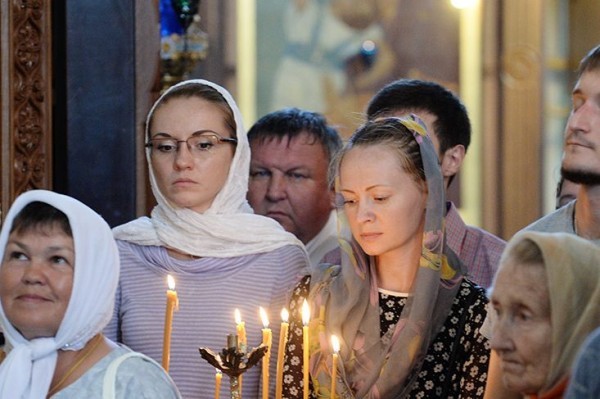The thought of fasting is always slightly sad. No, I am not sad about ice cream and cakes. Although I feel a bit guilty when they are in front of me. Seemingly behind your back, while leaving with your head in asceticism, a gentle reprimand is heard: “Who have you left us for? Who will have pity on you — lonely and hungry?”
Talking cakes! Ice cream driven to despair! How can I make it without you? How can you make it without me? Cheese rolls, shameful cupcakes , deceitful cakes. When will we meet again?
How, though, can there be no fasting? This is because it is the time for spiritual work, and if I’m not going to work, I’ll just get lost altogether. Forgive me, cakes that are dear to my heart. Patience, oh buns. Ice cream, devoted to the very end, — believe me, we will have brighter days!
Just kidding. I laugh. Of course, the sadness is not due to separation from cakes.
For a long time, there has been a certain annual rhythm of spiritual exercises in our Church. Four large fasts give rhythm to this repetitive cycle: The Great Fast, the Apostles’ Fast, the Assumption Fast, and the Nativity Fast. Four times a year there comes a time for each and everyone to freshen up, regain form, and discover lost substance. It is sort of like military training — so that the warriors of Christ don’t relax, and so that they “stay on target.”
Why be sad? “Military training” is fun and interesting. It invigorates and exhilarates. Doesn’t it? It’s all understandable and pleases the soul, but in fact — I don’t become any better from it! I fast, I pray, I attend services, I repent — but where is it, this desired renewal? It feels like I am stuck in one place and at times it seems that I have become worse from all these spiritual exercises. I get angry. I am irritable. Maybe its not worth the brother? Or am I doing something wrong?
I have a friend who is a zealous Christian. Although he recently started going to church, he has become alive with enthusiasm from the rhythm of church life, which is not shared in any way by his wife, who,while sober and sympathetic, is absolutely in no way a church person. She is a kind wife, but my friend once complained about her:
-“Can you imagine, Batyushka, she said to me: ‘You are getting ready to fast again? You fast all the time and go to services, but you still argue at home as before? You pray, but don’t change!’ ”
An experienced debater knows that its impossible to win an argument with a woman. The best way to argue with a woman is to set another lady on her. Here, though, it is not necessary to spar. The spouse was insightful. What true words!
Thank you to this sensitive woman. She pinpointed and articulated the problem. You pray, but don’t change! You fast , but don’t become kinder! Why don’t we change? — That’s the big question! Why don’t we change for the better?
We can easily become corpulent during a fast, but rarely do we become kinder. Why doesn’t fasting make us nicer? Why do our spiritual exercises remain fruitless? What are we doing wrong?
The most important thing to grasp is that fasting is not a goal but a means, and the means have a subordinate role. The nature of fasting and prayer as a spiritual exercise is universal in every developed religion or spiritual school, for example, in philosophy, certainly there are spiritual exercises that help man to subdue his body to the spirit and emotions.
Of course, depending on religious or philosophical doctrine, the character and the tasks themselves for these spiritual exercises may vary and differ dramatically. Buddhist Prayer and fasting is something completely different than Christian fasting and prayer. Buddhists also pray, and, at times, conduct a much stricter fast than any of the Orthodox monks, but from an evangelical point of view, all these Buddhist exercises are not only futile but harmful. We differ not only in our motives, but also in the task in front of the ascetics.
In the Gospel, there is no commandment to read evening prayers or observe the Dormition Fast, nor is there is an order of service for vespers, nor does it mention a canon to the sacrament. Ascetic exercises and the rules people created, in no way lessens the value of these rules. Asceticism is the experience of the Church, purchased by the sweat and blood of many generations of ascetics who sought the correct path to attaining the Holy Spirit of God. That Spirit is the authentic and unselfish love for God and people.
The Gospel is the icon of Christ, in whose image we must learn live, think, and act. Christ is the Incarnate God, the Lover of mankind, bequeathing us to learn to love people, to live in truth, be faithful to God, and, in our deeds and thoughts, be like our God — forgiving and merciful. This is the goal of our spiritual life. If it is indeed simple —to be kinder, attain genuine kindness and a more merciful heart, then this is the goal. There are many means of achieving it found in the experience of the centuries old Church, and all of them, unfortunately, are things which are difficult and unpleasant.
My singing teacher used to say: “The most dangerous thing for the voice is not to sing.” If you are succeeding at something, you definitely need to keep in shape.
This principle also applies to athletes and musicians, for translators, and even politicians. We have to constantly resist the inertia of muscles, words, and emotions. Every day, a good pianist reminds his fingers who is in charge and does not allow them to relax, because it is very easy to loose necessary skills and, at the same time, loose a fight with the instrument.
As people of faith, we too need to keep in shape. If anything, prayer requires professionalism, which is senseless without consistency and constraint, and without following a prescribed rhythm. “…The Kingdom of heaven has suffered violence, and men of violence take it by force.” (Matt. 11:12).
However, you should always remember that prayer and fasting are a means, not an end. They should aid a person in the acquisition of the Holy Spirit of God, the Spirit of love and kindness, because, we can never be truly kind and loving under our own power. If this goal falls out of the ascetic’s horizon, everything turns into an absurd selfless kind of sport: fast for the sake of fasting and prayer for the sake of analyzing, when all the joy of fasting is emotional comfort — I did everything as it should be.
An athlete may revel in achievements made while fasting, but not a Christian. You can even master the technology of heartful prayer. Here, too, it has its own mechanics, but without a renewal of the heart, without acquiring charity and love, without kindness, it will merely be the original skill, akin to mnemonic tricks and magicians.
However, even if the purpose of fasting and prayer isn’t lost, nevertheless, we should remember that we must learn kindness and strive not only for fasting and prayer, but also to be charitable, affectionate, and friendly. We humble ourselves in prayer and limit bodily consolations, in order to escape from the fetters of our own feelings, to see living and vulnerable people, yearning for a kind word, a sincere smile, or sympathy.
The Gospel, speaking about compulsion, refers not only to the compulsion of prayer or fasting. Being compelled to be kind is much more important. It should cause you to be amiable, sympathetic, considerate and attentive, to constantly be working on this, to try to be (don’t be scared of this phrase) professional at being kind and to constantly maintain this noble professionalism.
Virtue does not come even by prayerful petition, it requires long and toilsome work. Most importantly, do not be afraid of this work, and therefore it is so strange and gratifying to read the words of St. Macarius of Egypt, famous for prayer and fasting:
“If one, lacking prayer, compels himself to only one prayer , in order to have the grace of prayer, but does not compel himself to meekness, to humility of mind, to love, to fulfill other commandments of the Lord, and does not care about and does not make work and effort to succeed therein; then in proportion to his dispensation and free will, and according to his petition, is given some measure of prayerful grace, though his disposition remains the same as it was before. He is not meek, because he has not sought work and has not prepared himself to become meek. He is not humble, because he did not ask and did compel himself to that. He has not love for all, because he did not care about this and did strive for it while asking in prayer.[1].
This is where the sadness comes from. It happens that one can can remain an evildoer even if praying fervently and passionately. It is no good. So, I become an athlete in religion. I can even act in competition with the Buddhists — and out-pray and out-fast some — only what is there for me from Christ? Does he recognize me as his son and laborer if I am carried away by penance and have completely forgotten about kindness and love for people?
Then, suddenly: What is the point of praying? Shouldn’t we focus all our attention on the reformation of thoughts and deeds — in order to be kind? Wouldn’t that be a spiritual exercise?
Have you tried not to pray? Try it. If only to remember for your entire life how stale and dry the soul is without prayer and then how much work it takes to revive it. Without prayer, our efforts of kindness become cheap psychological training that still does not lead to anything, because goodness without the efforts of prayer always turns into hypocrisy.
What about fasting then? Isn’t it unnecessary in this case?
Prayer requests not only the soul but also the body. It also dries up without the consecration of prayer, but prayer can not join the body without restraint. You can not let the body go without prayer. It will be absolutely terrible. These things are understandable, even to talking cakes. They know a lot about this, and therefore forgive us little fasters and our humble penance.
[1] St. Macarius the Great. Lesson// Philokalia. M., 1905, Volume 1, pp. 204 – 205.
Translated from the Russian.






















